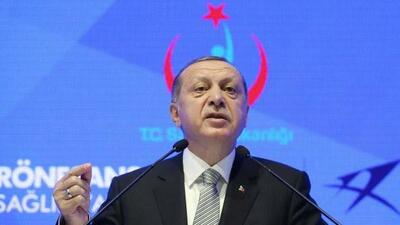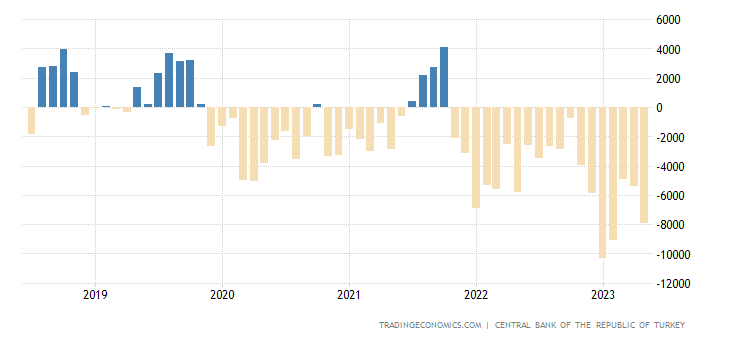Türkiye: Erdogan changed his political waltz to save the economy

Over the last few weeks there has been a decisive change of political position by Erdogan and Turkey. After the victory in the political elections, really narrow, there has been a certain stiffening of the position towards Russia, with the fighters of the Ukrainian Azov battalion being sent home, and therefore a yes, albeit moderate and postponed over time, to the Sweden's entry into NATO.
This news has put Erdogan at the center of the international scene, but, in a sense, it has also shown a decisive change in Turkish politics. Behind this turnaround will we not have difficulties in managing the Turkish economy such as to make us fear profound internal upheavals? Because there are some worrying signs in this direction.
The analysis that Turkey is gripped by its worst economic crisis since the major calamity of 2000/2001 that led to the IMF bailout is not in doubt. Erdogan's growth-at-all-costs stance that kept the country's boom-and-bust economy going for much of the next two decades, BlueBay Asset Management's Timothy Ash said July 17 after a week-long visit in Turkey, it has created “an economic mess of distortions, misallocation of resources, and price and market distortions”.
However, summarizing how “Erdogan's unorthodox, and simply wrong, views on interest rates…were instrumental in creating the crisis conditions”, Ash stated that “for whatever reason Erdogan seems to finally understand (again) that the its policies are no longer tenable [and] it is clear … that without change Turkey is heading towards a systemic crisis: BOP [balance of payments] towards banks, then probably towards sovereign debt”.
After his controversial re-election in late May, Erdogan put aside some pride by appointing a new market-friendly economic team led by Finance Minister Mehmet Simsek and Central Bank Governor Hafize Gaye Erkan, two former Wall Street bankers.
Simsek and Erkan immediately moved to straighten out the Erdogan administration's twisted fiscal and monetary policies, but their business looks a bit like the well-known game of jenga, in which you have to remove bricks without toppling the complete building. In this case, economic and monetary policy is touched very carefully, a little at a time, to prevent everything from collapsing.
Among the first necessary measures is certainly the rearrangement of the current accounts, which are increasingly negative over time and no longer in a surplus, not even a minimum, for two years:
This imbalance is one of the foundations of the progressive and seemingly unstoppable devaluation of the Turkish lira crisis, itself one of the roots of the devaluation. The imbalance in the current account largely depended on imbalances in the trade balance, but this in turn was sacrificed to maintain growth at an acceptable level. now, after the elections, the trade deficit has started to slow down, but this has not yet had an effect on the current account balance. In short, a great problem not easy to solve.
A July 17 BBC report assessed that the Turkish leader's geopolitical change was linked to his need to reassure Western investors. He quoted Murat Gulkan, head of OMG Capital Advisors, a small Istanbul-based investment firm, as saying about Turkey's economic woes: “There really isn't any quick, magical cure in sight. You need to prioritize issues and perform triage. This involves cooling down the economy, which of course is politically undesirable.” It takes time for a therapy that is not easy.
Al Monitor also speaks of a political change in the face of "an acute financial crisis and a tight foreign currency" and with "Erdogan's government scrambling to attract international funds to the country".
“As part of his first regional tour since his re-election in May, Erdogan will travel to the Gulf countries on Monday [July 17] mainly to secure much-needed funds. The revitalized EU bid may have been driven by a similar motivation,” said the publication, before quoting Serhat Guvenc, professor of international relations at Kadir Has University in Istanbul, who said: “Government priority in this moment is to recover the economy. One of the ways to do this is to continue the modernization of the customs union”.
Despite the colossal hardships facing the Turkish economy, Ash, it must be said, sees a viable way out of the chaos.
“It could be argued,” he said, “that despite the dire macroeconomic backdrop, the appointment of a credible new economic policy team, the first steps toward policy normalization and then the prospect of a major Gulf bailout [with commitments that maybe it adds up to $75bn – $100bn total] plus better relations with the West and the prospect of a new customs union [with the EU].” However, these are two policies that are not always perfectly compatible and which require profound changes in Turkish politics. If the Gulf powers are on good terms with Russia, the EU, at the moment, is much less supportive of Erdogan's "Walzers". Hence the need to cool the good relations with Moscow and instead improve them with NATO.

Thanks to our Telegram channel you can stay updated on the publication of new articles from Economic Scenarios.
The article Turkey: Erdogan changed his political waltz to save the economy comes from Scenari Economici .
This is a machine translation of a post published on Scenari Economici at the URL https://scenarieconomici.it/turchia-erdogan-ha-cambiato-il-suo-walzer-politico-per-salvare-leconomia/ on Tue, 18 Jul 2023 07:30:45 +0000.

